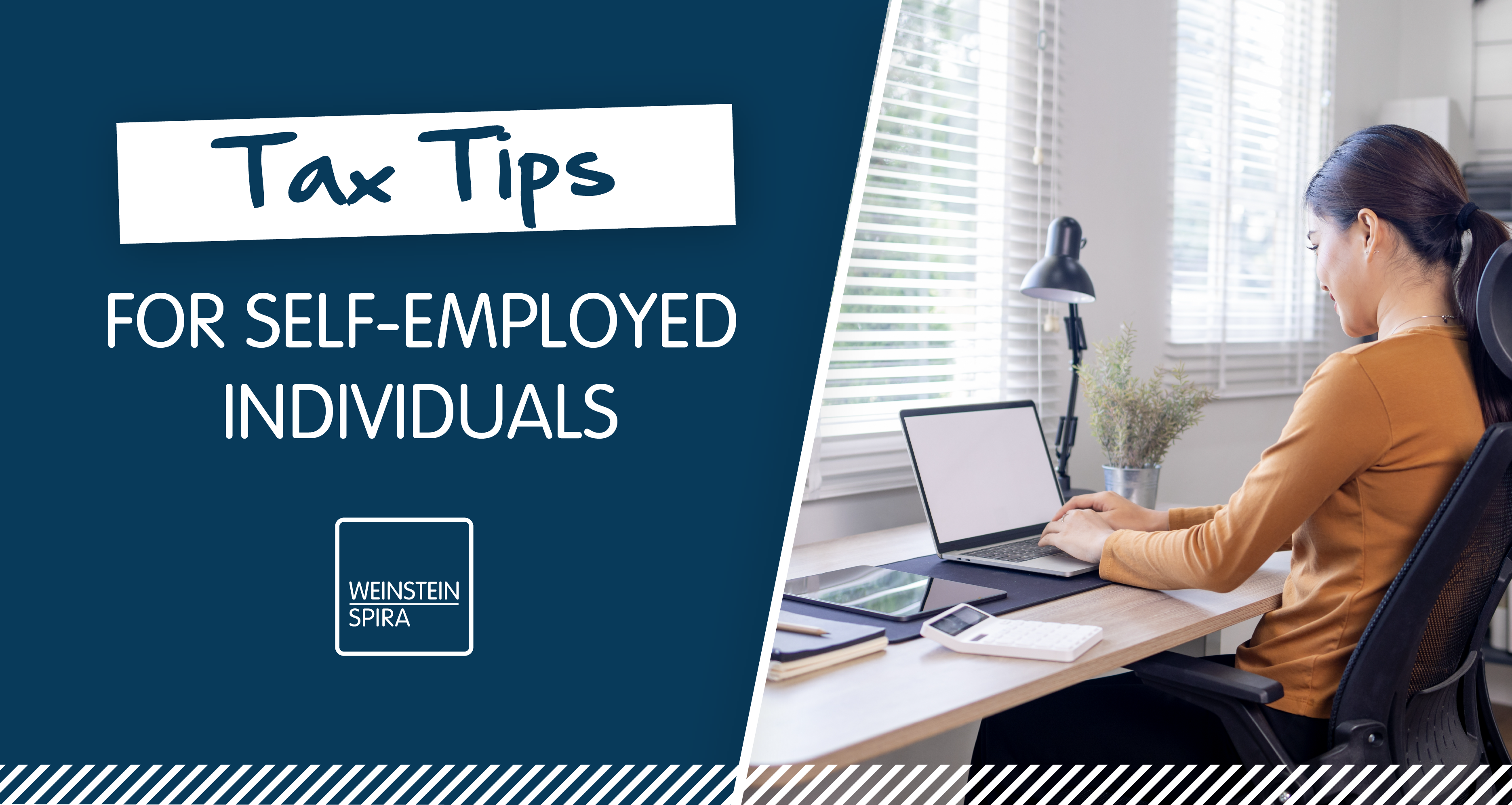In this blog, we will dive into tips to effectively tackle your taxes if you are self-employed. We will investigate who qualifies as self-employed, the tax implications and what applicable deductions can help you save during tax time.
Who Is Considered Self-Employed?
According to the Internal Revenue Service (IRS), you are considered self-employed if one of the following three apply:
- You carry on a trade or business as a sole proprietor or an independent contractor.
- You are a member of a partnership that carries on a trade or business.
- You are otherwise in business for yourself (including a part-time business).
As a self-employed individual, you are required to file your tax return annually and pay estimated taxes quarterly. It is key to note that because you are not earning wages from an employer who would generally withhold federal income taxes for you, you will be responsible for calculating and paying quarterly tax estimates on your own. Failing to do so can result in interest and penalties. Taxpayers can use Form 1040-ES to help determine what minimum payment is required for the tax year. Estimated tax payments can be made online or by mail.
Self-Employment Tax
Self-employed individuals are typically subject to self-employment (SE) tax in addition to income tax. SE tax includes Social Security and Medicare tax. This is similar to the Social Security and Medicare taxes that are withheld from the pay of most wage earners who work for an employer. However, since you are self-employed, you pay the combined employee and employer amount based on net earnings of $400 or more. The tax amounts are 12.4% for Social Security tax up to $168,600 of your net earnings and a 2.9% Medicare tax on your entire net earnings. To offset the burden of having to pay both sides of these taxes, taxpayers can deduct half of the SE tax liability for the tax year as an above-the-line deduction in their federal income tax return, which reduces adjusted gross income (AGI) and ultimately federal income taxes.
Financial Records
Maintaining accurate financial records is crucial to effectively complete your tax return filing. One of the best ways to keep track of your business activity is to separate your business accounts from your personal accounts. This will ensure that you are only deducting business-related expenses. Business expenses need to be “ordinary and necessary.” IRS Publication 535 defines an ordinary expense as one that is common and accepted in your industry. A necessary expense is one that is helpful and appropriate for your trade or business. An expense does not have to be indispensable to be considered necessary. It can be helpful to utilize bookkeeping software or hire a bookkeeper to maintain your business records.
Applicable Deductions
As a self-employed individual, you can take advantage of several deductions to minimize your tax burden. Some that may apply are the home office, self-employed health insurance, meals and travel, vehicle use deductions and retirement plan deductions.
Home Office Deduction
Home office expenses can be deducted if you have a workspace that is part of your home that you regularly use exclusively for business. This can apply whether you rent or own your home. The qualifying expenses are the business percentage of mortgage interest, utilities, insurance, etc. There are two methods that can be used to calculate the home office deduction. First is the regular method, where you compute the business use of home deduction by dividing the expenses of operating the home between personal and business use. You may deduct direct business expenses in full and allocate the indirect total expenses of the home to the percentage of the home floor space used for business. The second method is the simplified method, where you use an IRS determined rate, currently $5, and multiply your office’s total square feet by that rate, up to 300 square feet, with a maximum deduction of $1,500.
Self-Employed Health Insurance Deduction
If you are self-employed and not eligible to participate in a health plan, for example through your spouse’s employer or your parent’s employer, you can deduct all your health, dental and qualified long-term care insurance premiums. These deductions can also include premiums paid to cover your spouse, dependents and children younger than 27, even if they are not your dependents. This deduction is reported as an adjustment to income on Schedule 1 on the 1040, and you do not have to itemize to claim it.
Meals and Travel Expense Deduction
If you incur a meal expense while traveling, at a business conference or meeting with a client, you can claim 50% of the meal cost as a deduction. The meal cannot be extravagant. Unfortunately, you cannot deduct your desk lunch or any meals or snacks you might buy while working from a coffee shop or restaurant. Travel expenses for business are generally fully deductible, including airfare, car rental and lodging. It is helpful to keep track of the business purpose of the meal or travel expense so as not to inadvertently include personal expenses with your business expense deduction.
Vehicle Use Deductions
If you use your car for business, there are tax deductions available. If you use your vehicle only for business purposes, the entire cost of its ownership and operation are deductible, subject to some limits. If you use the car for both business and personal purposes, you can only deduct the business use cost. In the case where it is both a business and personal vehicle, you can use either the standard mileage rate for your deduction, which for 2024 is $0.67 per mile, or the actual expenses you incurred. Using the standard rate is the easiest, as it requires you to just note the business miles and dates driven versus calculating the business percentage of driving and gathering all the car operating costs for the year.
Retirement Plans
Self-employed individuals have many of the same options to save for retirement, on a tax-deferred basis, as regular employees. One commonly used option is the Simplified Employee Pension (SEP), where you can contribute up to 25% of your net earnings for self-employment, up to $69,000 for 2024. There are also 401(k) plans and SIMPLE IRA plans available, and it is worth discussing with advisors and explore which retirement savings plans are the most beneficial in reaching retirement goals and achieving tax savings.
What Cannot be Deducted
While many business deductions are available, some items cannot be deducted for tax purposes. Examples of nondeductible expenses include fines and penalties, personal expenses, business charitable contributions (which would instead be deducted as itemized expenses reported on Schedule A), business gifts to an individual over $25 and entertainment expenses. Remember that expenses should meet the ordinary and necessary rules to be considered business expenses.
Navigating taxes as a self-employed individual requires diligence. By understanding the nuances of self-employment status, filing requirements and tax implications, such as the SE tax, individuals can be prepared to manage their financial responsibilities. Deductions offer significant opportunities to reduce taxable income, so it is important to maintain financial records and seek guidance from tax professionals to maximize deductions and ensure compliance with IRS regulations. With these practices in place, self-employed individuals can not only streamline their tax filing process but also optimize their financial outcomes throughout the year.



